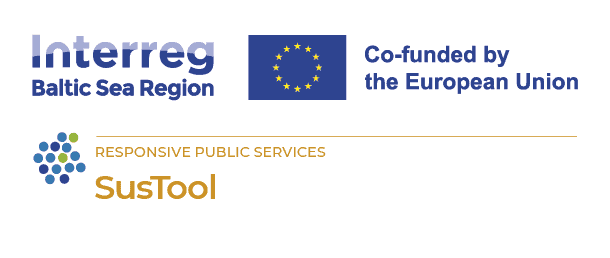
Video interview with the lead partner: Driving innovation and sustainability across the Baltics and Finland
07 April 2025
As sustainability emerges as an increasingly important consideration for businesses across Europe, enterprises are facing growing pressure to adapt to new environmental, social, and governance (ESG) standards. To support them on this journey, the SusTool project—led by the Estonian Ministry of Economic Affairs and Communications and funded by Interreg Baltic Sea Region—is developing the ESG Tool: a free, digital platform that helps companies navigate the complexities of sustainability reporting. We spoke with Joanna Annion, the lead partner´s project manager behind ESG Tool, to learn more about the initiative, the challenges of international collaboration, and how this tool will support businesses in making greener, more responsible choices.
What inspired you to initiate the creation of such a project, and why now?
We saw the need in the Estonian Ministry of Economic Affairs and Communications to help companies on their sustainability journey, as our main focus is to empower companies innovate and minimize the administrative burden in order to support especially the SMEs who make up most of our economy. And sustainability and green topics are more and more important, so we really need to support companies and also to learn with them the new way of thinking, as there are no CSRD experts. Therefore, we have learned a lot in this project together with Estonian, Latvian, Lithuanian, and Finnish associations and ministries.
What is the most exciting, educational, or unexpected thing you’ve experienced during the project?
As I said, ESG is a new terminology, and for the past two years we have been focusing on finding answers to questions and methodology that really did not even exist before. Questions that big consulting companies are struggling with, and with our partners Ministry of Smart Administration and Regional Development of the Republic of Latvia and Latvian Information and Communications Technology Association (LIKTA) , Innovation acceleration hub DIMECC from Finland, DigiTech Sector Association INFOBALT from Lithuania, Zero Waste Estonia, Estonian Association of Information Technology and Telecommunications, the Estonian Finance Ministry, and us— the Estonian Ministry of Economic Affairs and Communications —as the lead partner. Also, we have got great support from our associated partners like the Estonian Environmental Investment Centre.This is exciting and at the same time challenging. And we have to be realistic in an ever-changing political and economic climate, where in many cases we have to find the best possible option. That might not be ideal, but it is the best at the time and the moment. And find compromise.
How has it been to collaborate across multiple countries—Estonia, Latvia, Lithuania, Finland? How do you keep all the partners on the same page?
As in any relationship, I think open communication is the key for successful international cooperation. I think we are lucky in this project, as Estonia, Latvia, Lithuania, and Finland have a quite similar cultural background, we work in the same time zone, and we understand each other well. Also, this has helped us to organize regular face-to-face meetings to better our cooperation and also celebrate small wins together, as we did last week in Riga when we finalized the partner tool testing results, and now we can move forward to testing with companies.
Have you received any external feedback on the project yet, and if so, what kind? What are the expectations of the companies?
Expectations are very high, as the companies really need help and support on their ESG journey, and this is why we are creating this free tool. Also, the recent Omnibus proposal from the EU Commission from the 26th of February has created new expectations from companies. But even if the regulations tend to change and have to change according to the environment we live in, the Green Deal and its goals are still valid, and we have to move towards greener business, meaning our tool will help companies to start with their assessments.
When the project officially ends, what happens next?
The tool will be available free of charge for companies from all sectors, big or small, in Estonian, Latvian, Lithuanian, Finnish, and English. I really hope that we can continue updating and developing it so that it will be useful for companies in years to come and will be adjusted according to the regulatory changes.





